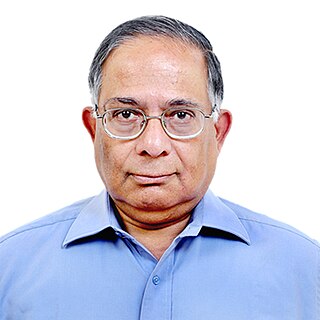Related Research Articles
The Shanti Swarup Bhatnagar Prize for Science and Technology (SSB) is a science award in India given annually by the Council of Scientific and Industrial Research (CSIR) for notable and outstanding research, applied or fundamental, in biology, chemistry, environmental science, engineering, mathematics, medicine, and Physics. The prize recognizes outstanding Indian work in science and technology. It is the most coveted award in multidisciplinary science in India. The award is named after the founder Director of the Council of Scientific & Industrial Research, Shanti Swarup Bhatnagar. It was first awarded in 1958.

Kalyanapuram Rangachari Parthasarathy is professor emeritus at the Indian Statistical Institute and a pioneer of quantum stochastic calculus.
Surindar Kumar Trehan was an Indian mathematician who specialised in non-linear stability in magnetohydrodynamics.
Jang Bahadur Shukla is an Indian mathematician who specialised in mathematical modelling of ecological, environmental, physiological, and engineering systems.
Inder Bir Singh Passi is an Indian mathematician who specialises in algebra.
Phoolan Prasad is an Indian mathematician who specialised in Partial differential equations, fluid mechanics. He was awarded in 1983 the Shanti Swarup Bhatnagar Prize for Science and Technology, the highest science award in India, in the mathematical sciences category. He is also a Fellow of the Indian National Science Academy (INSA).
Surender Kumar Malik was an Indian mathematician who specialised in applied mathematics, especially in nonlinear phenomena.
Tarlok Nath Shorey is an Indian mathematician who specialises in theory of numbers. He is currently a distinguished professor in the department of mathematics at IIT Bombay. Previously, he worked at TIFR.

Kalyan Bidhan Sinha is an Indian mathematician. He is a professor at the Jawaharlal Nehru Centre for Advanced Scientific Research, and Professor Emeritus for life of the Indian Statistical Institute.
Subhashis Nag was an Indian mathematician who specialised in complex analytic geometry, particularly Teichmüller theory, and its relations to string theory.

Kapil Hari Paranjape is an Indian mathematician specializing in algebraic geometry. He is a Professor of Mathematics at the Indian Institute of Science Education and Research, Mohali

B.V. Rajarama Bhat is an Indian mathematician specialising in operator theory. He is a Professor of Mathematics in Indian Statistical Institute, Bangalore.
Jaikumar Radhakrishnan is an Indian computer scientist specialising in combinatorics and communication complexity. He has served as dean of the School of Technology and Computer Science at the Tata Institute of Fundamental Research, Mumbai, India, where he is currently a senior professor.
Eknath Prabhakar Ghate is a mathematician specialising in number theory and working at the School of Mathematics, Tata Institute of Fundamental Research, Mumbai, India. He was awarded the Shanti Swarup Bhatnagar Prize for science and technology, the highest science award in India, for the year 2013 in the mathematical sciences category.
Ritabrata Munshi is an Bengali Indian mathematician specialising in number theory. He was awarded the Shanti Swarup Bhatnagar Prize for Science and Technology, the highest science award in India, for the year 2015 in mathematical science category. He is affiliated to Tata Institute of Fundamental Research, Mumbai, and the Indian Statistical Institute, Kolkata. Munshi obtained PhD degree from Princeton University in 2006 under the guidance of Andrew John Wiles.
Amalendu Krishna is an Indian mathematician in School of Mathematics, Tata Institute of Fundamental Research (TIFR), Mumbai, specializing in algebraic cycles and K-theory. He was awarded the Shanti Swarup Bhatnagar Prize for Science and Technology, India's highest prize for excellence in science, mathematics and technology, in the mathematical sciences category in the year 2016.
Sumit Ranjan Das is a US-based Indian high energy physicist and a Professor at the University of Kentucky College of Arts and Sciences. Known for his research on string theory, Das is an elected fellow of the Indian Academy of Sciences. The Council of Scientific and Industrial Research, the apex agency of the Government of India for scientific research, awarded him the Shanti Swarup Bhatnagar Prize for Science and Technology, one of the highest Indian science awards, for his contributions to physical sciences in 1998.
Aditi Sen De is an Indian scientist, a professor in quantum information and computation group at the Harish-Chandra Research Institute, Allahabad. She is known for her research on quantum information and computation, quantum communication including quantum cryptography, quantum optics and many-body physics. The Council of Scientific and Industrial Research, the apex agency of the Government of India for scientific research, awarded her the Shanti Swarup Bhatnagar Prize for Science and Technology for her contributions to physical sciences in 2018. She is the first female physicist to be given this honour.
Dr. Rajat Subhra Hazra is an Indian mathematician specialising in probability theory. He was awarded the Shanti Swarup Bhatnagar Prize for Science and Technology, the highest science award in India, for the year 2020 in mathematical science category. He is affiliated to Indian Statistical Institute, Kolkata. Dr. Hazra has a very broad range of research interests including extreme value theory, regular variation, random matrices, free probability, Gaussian free fields, branching random walks, membrane models, random graphs, etc.
U. K. Anandavardhanan is an Indian mathematician specialising in automorphic forms and representation theory. He was awarded the Shanti Swarup Bhatnagar Prize for Science and Technology, the highest science award in India, for the year 2020 in mathematical science category. He is affiliated to Indian Institute of Technology, Bombay.
References
- ↑ Sukumar Mallick; Saguna Dewan; S C Dhawan (1999). Handbook of Shanti Swarup Bhatnagar Prize Winners (1958 - 1998) (PDF). New Delhi: Human Resource Development Group, Council of Scientific & Industrial Research. p. 118.